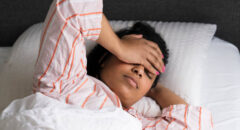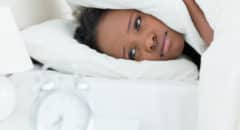 Narcolepsy involves many aspects and side effects. One in which is described as hypnagogic hallucinations that can seem so real, individuals often think that they’re real.
Narcolepsy involves many aspects and side effects. One in which is described as hypnagogic hallucinations that can seem so real, individuals often think that they’re real.
According to MoreThanTired.com, hypnagogic hallucinations are occurrences that are often described as nightmares or vivid (often frightening) dreamlike experiences that seem real while falling asleep or waking up. You may experience hearing sounds or words when drifting to sleep or have unwanted visions. Sleep paralysis often accompanies these hallucinations.
Hypnagogic or hypnopompic hallucinations are visual, tactile, auditory, or involve other sensory events, usually brief but occasionally prolonged, that occur at the transition from wakefulness to sleep (hypnagogic) or from sleep to wakefulness (hypnopompic). The person may hear sounds that are not there and see visual hallucinations. These visual and auditory images are very vivid and may be bizarre or disturbing.
What You Should Know:
- Hypnagogic hallucinations can occur without narcolepsy. People may be reluctant to admit to them for fear of being thought mentally ill. However, they are thought to occur in most people at least once in their lives.
- The sex ratio of men to women isequal.
- One study of 14,000 individuals reported that people with anxiety, depression, or bipolar affective disorder have a two-fold increase in experiencing hypnopompic or hypnagogic hallucinations at least once weekly.
- The same study reported that patients with adjustment disorders had a 1.5-fold increase in experiencing these phenomena at least once weekly.
- The study also reported that over half the individuals who experienced hypnagogic or hypnopompic hallucinations had no evidence of physical disorder, substance-abuse disorder, sleep disorder, or other psychiatric disorder.
Risk Factors:
- There is a tendency for hypnagogic and hypnopompic hallucinations associated with narcolepsy to be associated with certain HLA phenotypes.
- Tricyclic antidepressants have been reported to beassociated with hypnagogic and hypnopompic hallucinations.
When does it happen?
- Hypnagogic hallucinations can occur at the onset of sleep, either by day or at night. They are usually quite vivid and visual.
- Visual hallucinations usually consist of simple forms such as colored circles or parts of objects that may be constant or changing in size. A formed image of an animal or a person may appear and it is often in color.
- Auditory hallucinations are common but other senses are seldom involved. Auditory hallucinations can range from a few sounds to an elaborate melody. Threats or criticism are also reported.
- Another type of hallucination that is sometimes reported at the onset of sleep involves elementary cenesthopathic feelings (such as experiencing picking, rubbing, or light touching), changes in location of body parts (such as an arm or a leg), or feelings of levitation or extracorporeal experiences (like moving the body in space or floating above the bed) that may be quite elaborate.
- There may be a history ofnarcolepsy with the ability to fall asleep if at all tired or bored, often with social embarrassment. It may lead to the inability to hold down a job.
Are there treatments?
Hypnagogic hallucinations can be treated with REM-suppressing antidepressants, such as venlafaxine or other selective serotonin reuptake inhibitors. Despite their alleged role in causing hypnagogic and hypnopompic hallucinations, tricyclic antidepressants are also recommended for their treatment when associated with narcolepsy.
However, a Cochrane review was unimpressed by the evidence. Fluoxetine has also been recommended for this indication. Musical hallucinations may be helped by olanzapine, quetiapine, fluvoxamine, clomipramine, carbamazepine, valproate, and donepezil.
Find out more information on narcolepsy and the effects of sleep disorders on our Health Conditions page on BlackDoctor.org.









